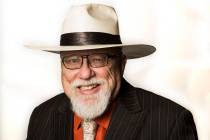Caring for people is ‘human work that everybody can do’
It’s happening increasingly in American life — men acting as caregivers.
Last year, when we weren’t talking about the stopping power of a variety of guns, 81-year-old Korean War veteran Ernest Williams and I talked about how he happily took care of his wife, who suffered with Alzheimer’s disease.
For six years, he had bathed and dressed and fed her. He also had brushed her teeth, combed her hair and sang her songs.
While women have long cared for family members at the end of life, much as they cared for infants and children at the beginning, men are far more often performing roles that had been traditionally “women’s work.”
Caring for people, Williams noted, is “human work that everybody can do.”
Studies reveal that in the past 15 years the share of male caregivers nationwide has doubled from 19 percent to nearly 40 percent. Watching this phenomenon play out — many times they are involved in the caregiving as well — are sons, and sons-in-law, daughters and daughters-in-law, many of whom have children themselves who also witness a man doing all he can to give comfort at a difficult time.
Given that families approve of such male behavior — research also shows dads are playing a heavier nurturing role with their children — and an economy that has seen male-dominated professions such as manufacturing and construction hemorrhaging jobs for years, it isn’t surprising that more men are entering nursing, a field long dominated by women.
“I think the stereotype of male nurses being effeminate is falling apart,” said 24-year-old Michael Halaska, who recently got his nursing license after a February graduation from a nursing program at the Roseman University of Health Sciences in Henderson. “I know the stereotype is out there, but no one has said to me I’m doing something only a woman would do. My friends and people I talk with think it’s a noble profession, that caring for people as a nurse isn’t gender based.”
Since 1970 the proportion of male registered nurses has more than tripled, from 2.7 percent to 9.6 percent.
It doesn’t hurt, of course, that the starting pay is generally good — almost $60,000 a year in Las Vegas.
We sit in a coffee shop and Halaska — his father’s a physician and his mother’s a microbiologist — says it’s tragic if anyone allows ignorant stereotypes determine what you’ll do in life. He thinks he’ll get a nursing position any day now.
A 2012 graduate in biochemistry from the University of Southern California, he decided he didn’t want to get a doctorate and do scientific research nor did he want to directly follow in his father’s footsteps.
“I’m an adrenaline junkie so research isn’t for me,” he said. “That’s why I want to be a flight nurse one day. And I didn’t want to be a physician because I saw what my father went through in internal medicine. Even when he’d go on vacation he knew he’d be coming back to answer 500 emails, write all these prescription refills, go over tests that had been taken while he was gone and then he’d see the same people for hypertension and diabetes over and over again until the next vacation. What he does, helping people with their health care, is very important. I want to do that, too. I’ll just do it another way.”
Halaska, a prep All American swimmer at Tehachapi (Calif.) High who also swam for USC, said he appreciates that nurses make autonomous assessments, diagnoses and interventions that save lives.
“The idea that all nurses do is follow doctor’s orders is wrong,” he said.
It is the hospital nurse, he said, who explains to patients what is happening, keeps them out of pain. And after a major surgery, it is the nurse who makes sure the patient’s oxygen and blood pressure levels are correct, keeps the circulation moving so dangerous blood clots don’t form in the legs, ensures that tubes and catheters are operating properly.
Because so many people are trying to get into nursing school in California, Halaska said he would have had to wait two years to get in. So he enrolled in Roseman’s accelerated bachelor’s nursing program for students who already had their science requirements out of the way. “It’s the hardest I ever worked,” he said.
He was lucky, he said, that his family could pay the staggering 15 month tuition at the private school, about $53,000, nearly the same tuition cost as a year and a half at Harvard.
A similar accelerated program at Nevada State College, which had 39 people vying for 16 slots, would cost $30,000 tuition for an out-of-state student and half that for a Nevadan.
“Roseman has a convenience niche for some students,” Halaska said. “Nursing is a growing field and there isn’t enough room in public universities. I was blessed to come from a wealthy family so I didn’t have to get loans as most students did.”
As he talks, Halaska grimaces. He explains that after he dislocated his shoulder recently after a snowboarding fall in Utah, he grabbed onto a chair lift passing by overhead and pulled until it popped it back into place.
Just like a Sylvester Stallone character did in the movies.
Sure, he says the Stallonesque move hurt like hell, but he added he tried not to show it because his girlfriend was on hand. Thankfully, his doctor found he didn’t do any unnecessary damage trying to impress his lady and now he must simply wear a sling for a couple of weeks.
While he does find the episode a tad embarrassing, he argues that something positive did come out of it.
His girlfriend is nursing him back to health.
Contact reporter Paul Harasim at pharasim@reviewjournal.com or 702-387-2908.

















